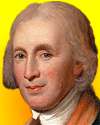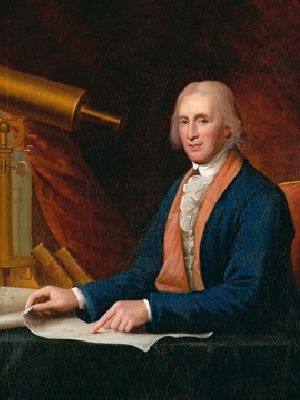 (source)
(source)
|
David Rittenhouse
(8 Apr 1732 - 26 Jun 1796)
American astronomer, instrument maker, surveyor, mathematician and astronomer and a prominent scientist in his era. He made observations (1769) of Mercury and the transit of Venus. Rittenhouse investigated magnetism and electricity.
|
An Account of Some Experiments on Magnetism,
in a Letter to John Page, Esquire, at Williamsburg.
by David Rittenhouse
from Transactions of the American Philosophical Society (1781)
[p.178] Read Feb 6, 1781.
AGREEABLE to the promise in my last, I shall now communicate to you some conjectures and experiments on magnetism, which may perhaps [p.179] either afford you some amusement, or induce you to pursue the subject to more certainty. I suppose then, that magnetical particles of matter are a necessary constituent part of that metal which we call iron, though they are probably but a small proportion of the whole mass. These magnetical particles I suppose have each a north and a south pole, and that they retain their polarity, however the metal may be fused or otherwise wrought. In a piece of iron which shews no signs of magnetism these magnetical particles lie irregularly, with their poles pointing in all possible directions, they therefore mutually destroy each other’s effects. By giving magnetism to a piece of iron we do nothing more than arrange these particles, and when this is done it depends on the temper and situation of the iron whether that arrangement shall continue, that is, whether the piece of metal shall remain for a long time magnetical or not.
There is some power, whencesoever derived, diffused through every part of space which we have access to, which acts on these magnetical particles, impelling one of their poles in a certain direction with respect to the earth and the other pole in the opposite direction. The direction in which this power acts I take to be the same with that of the dipping needle.
By applying a magnet to a piece of iron it becomes magnetical; for the magnet acting strongly on the above mentioned particles, that action arranges them properly; overcoming the resistance of the surrounding parts of the iron, and this resistance afterwards serves to secure them in their proper situations, and prevents their being deranged by any little accident. If we place a piece of iron in or near the direction of the dipping needle, it will in time become magnetical; that general power producing in this case the same effect as the application of the magnet, though in a weaker degree.
[p.180] Iron or soft steel receives magnetism more easily than hardened steel, but will not retain it; may not this be, because the magnetical particles are not so closely confined in soft as in hardened steel, and on that account more easily admit of arrangement or derangement. By making a piece of steel red hot, or by twisting it or beating it with a hammer, we may effectually destroy its magnetism. Now all these operations certainly derange the particles which compose the bar. By rubbing one piece of steel with another, magnetism may be produced, and it is easy to conceive how this operation, by the tremulous motion which it excites, may contribute to arrange the magnetical particles.
We took a soft steel ramrod, which did not discover the least sign of magnetism, and holding it in the direction of the dipping needle, struck it several smart blows with a hammer, on one end; then laying it on a watch chrystal it traversed very well; that end which was held downwards, when struck, becoming a north pole, whether the stroke was applied to the upper or the lower end. By turning the south end downwards and striking it afresh, the magnetism was destroyed or reversed, and it was curious to observe how very nicely you must adjust the number and force of the strokes, precisely to destroy the magnetism before communicated, without giving it anew, in a contrary direction. When we held the ramrod directly across the line of the dipping needle, whilst it was struck with a hammer, on many trials it did not discover any signs of magnetism. But when held in any other direction, that end which approached nearest to the point which the lower end of the dipping needle tends to, always became the north pole. From all this does it not seem very probable that during the concussion of the stroke, and whilst the magnetical particles of the rod were most disengaged from the surrounding matter, the active power above-mentioned seized them and arranged them properly, where being confined, [p.181] the rod afterwards remained magnetical. All this is nevertheless little more than conjecture, until confirmed by further experiments.
- Science Quotes by David Rittenhouse.
- 8 Apr - short biography, births, deaths and events on date of Rittenhouse's birth.
- More for David Rittenhouse on Today in Science History page.
- David Rittenhouse, by Brooke Hindle. - book suggestion.





